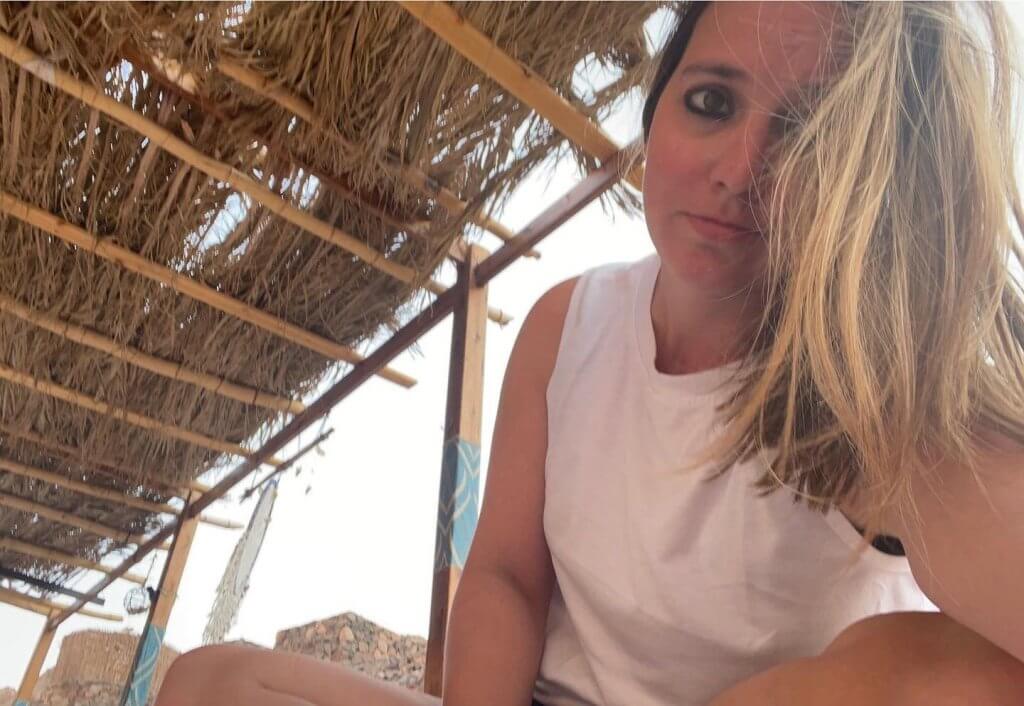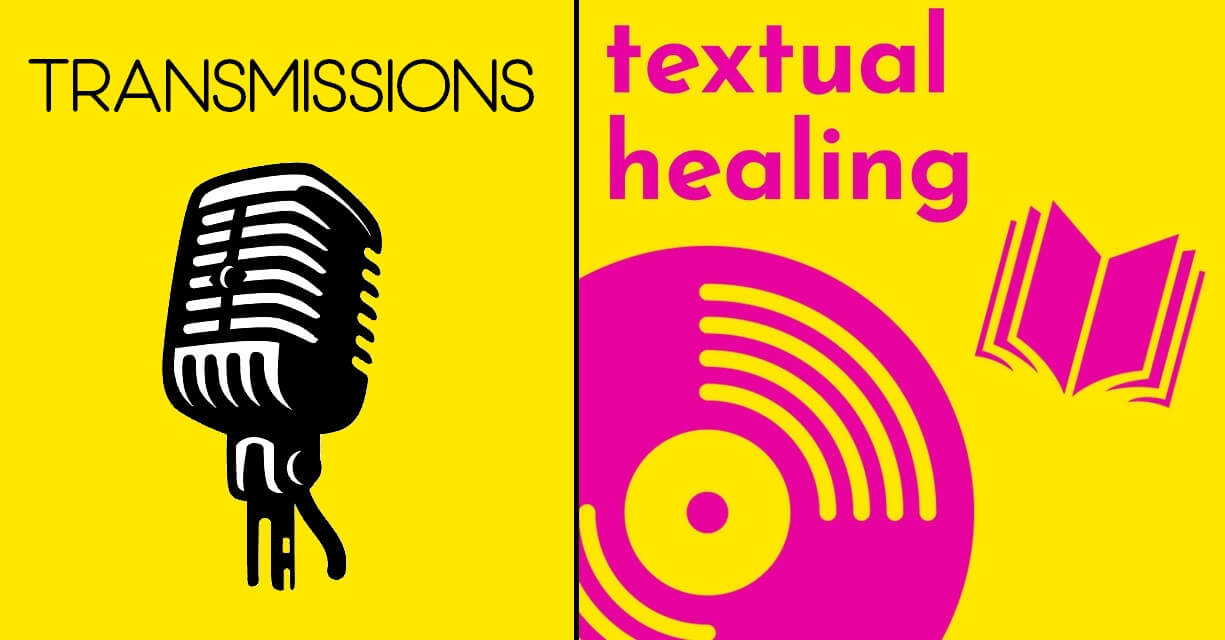Welcome to Transmissions, an interview feature in which X-R-A-Y profiles podcasts.
Mallory Smart is a Chicago-based writer, editor-in-chief of Maudlin House, and doer of many other things. She is the host of the literary/music podcast, Textual Healing, and is the co-host of the horror podcast, That Horrorcast. Her new book, I Keep My Visions to Myself, is available now through With an X Books.

Rebecca Gransden: How long has the podcast been in existence, and how have you seen it grow over that time?
Mallory Smart: I can’t find the exact date that I started Textual Healing, but it’s been around for almost 3 years. It started off as something I did with a co-host and it was far more structured than it is now. I noticed that the writers that came on, preferred it to be looser and more like a conversation than an interview. So as it’s grown, it’s become looser where I just chat with the guests and guide them into the direction of what questions I’d have. The initial listens each episode gets has more than tripled from when it first began but obviously people still go back to the old episodes making the numbers about even. I also started to make it a weekly podcast instead of something I did twice a month. I do two full interviews and two “Off the Record” episodes where guests read excerpts of their writing and match it to a song that they feel matches it.
RG: Where did the idea for the podcast come from?
MS: It’s dorky, and I even told him when he was on the show: Noah Cicero. I love his poetry collection, Bipolar Cowboy. Within the poems he mentioned so much music, and the second to last poem even suggests to the reader to play a specific recording of “Skinny Love” by Bon Iver while reading. It made me think about how much music influences my writing and how I wished I go direct readers to listen to a certain thing prior to reading something of mine. So instead of doing so myself, I thought I’d ask other authors what music inspired what they were working on or helped them on their weird journey throughout the literary world.
RG: How did you decide upon a title for the podcast?
MS: Claire Hopple did. I had a few ideas for titles but I decided to tweet about it to see what other people thought it should be named and she dropped this ‘dad joke’ of a title and I loved it. I hope people get the reference.
RG: Are there any podcasts that influenced or encouraged you to start the project?
MS: I never thought I’d do a literary podcast. I always thought I would do a podcast about horror films, which I eventually did: That Horrorcast which was influenced by Horror Queers. This idea just came out of nowhere. I do love All Songs Considered so maybe that played a role.
RG: What episode of the podcast would you recommend to someone who is new to what you do?
MS: KKUURRTT: Sound Waves And Ramblings At The American Music Festival OR The Dream of the ’90s is Alive in Jessamyn Violet. Those are the best literary ones.
RG: How do you go about selecting what to feature on each episode?
MS: It’s pretty guest driven so there isn’t a lot of thought on what to feature, but there are three that are just about a topic. One was about the 100th episode, another was about Taylor Swift dropping “Midnights” and the other was a very random episode that was about how music on roadtrips inspire writing. I didn’t come up with that one though. I saw a past guest tweet about it and I immediately messaged them and said we should talk about it since it’s something that plays a factor in my writing as well.
RG: If your podcast features guests, how do you go about finding them?
MS: They tend to find me through mutuals who listen or presses that suggest it to them. But it’s really about whether I think they have a vibe that I haven’t taken in yet. Twitter plays a big factor. Someone will do a random tweet that hits and I DM immediately to see if they want to be on the show.
RG: If you are a writer, has the podcast impacted your writing life? and conversely, has a writerly disposition influenced the podcast?
MS: It hasn’t really impacted my writing, but as a writer I think it’s helped me to guess which questions an author might really want to get asked. So many podcasts solely focus on the writing. As a writer, I know that can be exhausting so I decide to take a lighter approach and focus on the writer instead.
RG: Do you listen to podcasts?
MS: Daily.
RG: What is the best podcast out there at the moment, the one you are excited for when each new episode drops?
MS: It’s nerdy but I’m obsessed with Stuff You Missed In History Class and there’s a podcast about pirates that I’ve been listening to for 3 years now. But the first thing I do every morning is make coffee and listen to Up First.
RG: What do you dislike about podcasts?
MS: As a listener, I can’t think of anything. As a guest, I dislike when people want to use Zoom because I’m socially awkward, so I tend to lie and just say my webcam broke (which is a really hard to sell lie these days). As a host, when there are too many background noises on the guests end. I can’t focus on the interview and it ruins the pacing.
RG: Who is your dream guest?
MS: Someone please call Carrie Brownstein or Grady Hendrix.
RG: Is there a theme or subject you are burning to cover?
MS: Books that are directly inspired by songs and songs that are directly inspired by a book.
RG: Is there a podcast that doesn’t exist, but you wish did?
MS: History dork again: a podcast that focuses entirely on Egyptian history spanning from 3150 BCE to 600 BCE.
RG: Is there a podcast that exists, but you wish didn’t?
MS: There are a few redundant literary ones that I won’t name but other than that, I think there’s room for everything.
RG: For techheads, which single item of kit do you consider essential for the production of the podcast, and what would you say are the basics needed for those new to podcasting?
MS: A dynamic mic. A lot of people use condenser mics because they’re cheaper but they pick up too much background noise. As for basic needs: mic, HEADPHONES, and a good platform to record audio from. I don’t recommend Zoom.
RG: If someone would like to support independent podcasts, what are the best ways to do this?
MS: Patreon is really the best way. Or buying merch if the podcast has any.
RG: Looking back on the podcast, are there favorite episodes, episodes that stand out to you, or episodes that didn’t go as you would’ve liked?
MS: I have favorites but won’t say. I’d say you can guess but most people would assume that they’re ones where I had a writer on multiple times. The best seem to be with people I don’t know at all but there are some frustrating episodes where I’ve lost control of the conversation and the guest can’t seem to be brought back into the topic that we were trying to discuss.
RG: What are your plans for the future?
MS: Just keep going and expanding. There are so many other writers I want to have on the show, but it needs to be bigger for some and still be around. That’s why listener support is so important. Without it, planning for the future is hard.
RG: If you liked that, you may also like this. Are there any podcasts on a similar wavelength to your own that you would recommend to a listener who appreciates what you do?
MS: If there’s a podcast that’s similar to my own I don’t know it. But Kirsti MacKenzie just started a lit mag that follows the same vibe: Major 7th Mag.
Textual Healing can be found at Spotify and Patreon.

